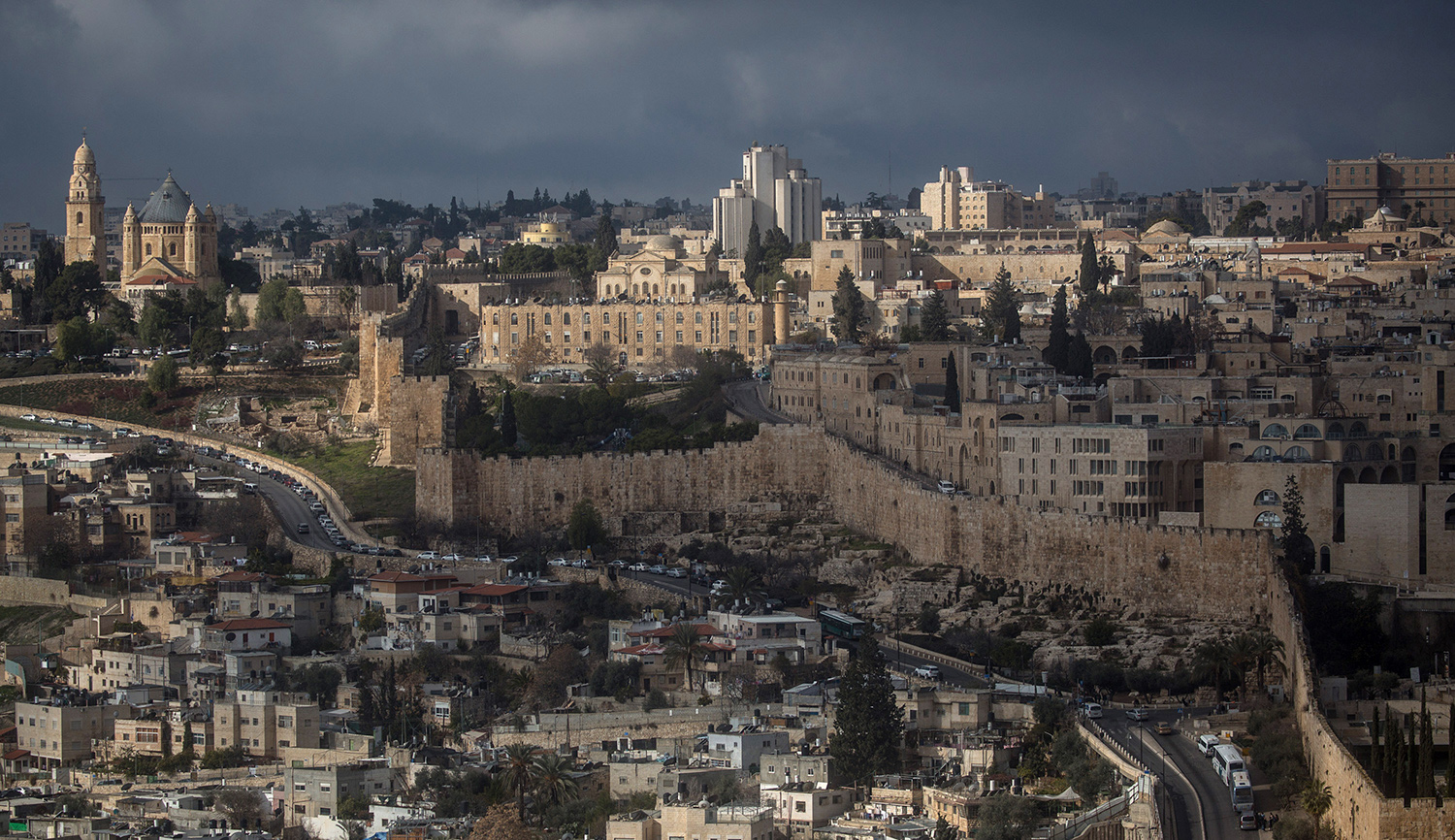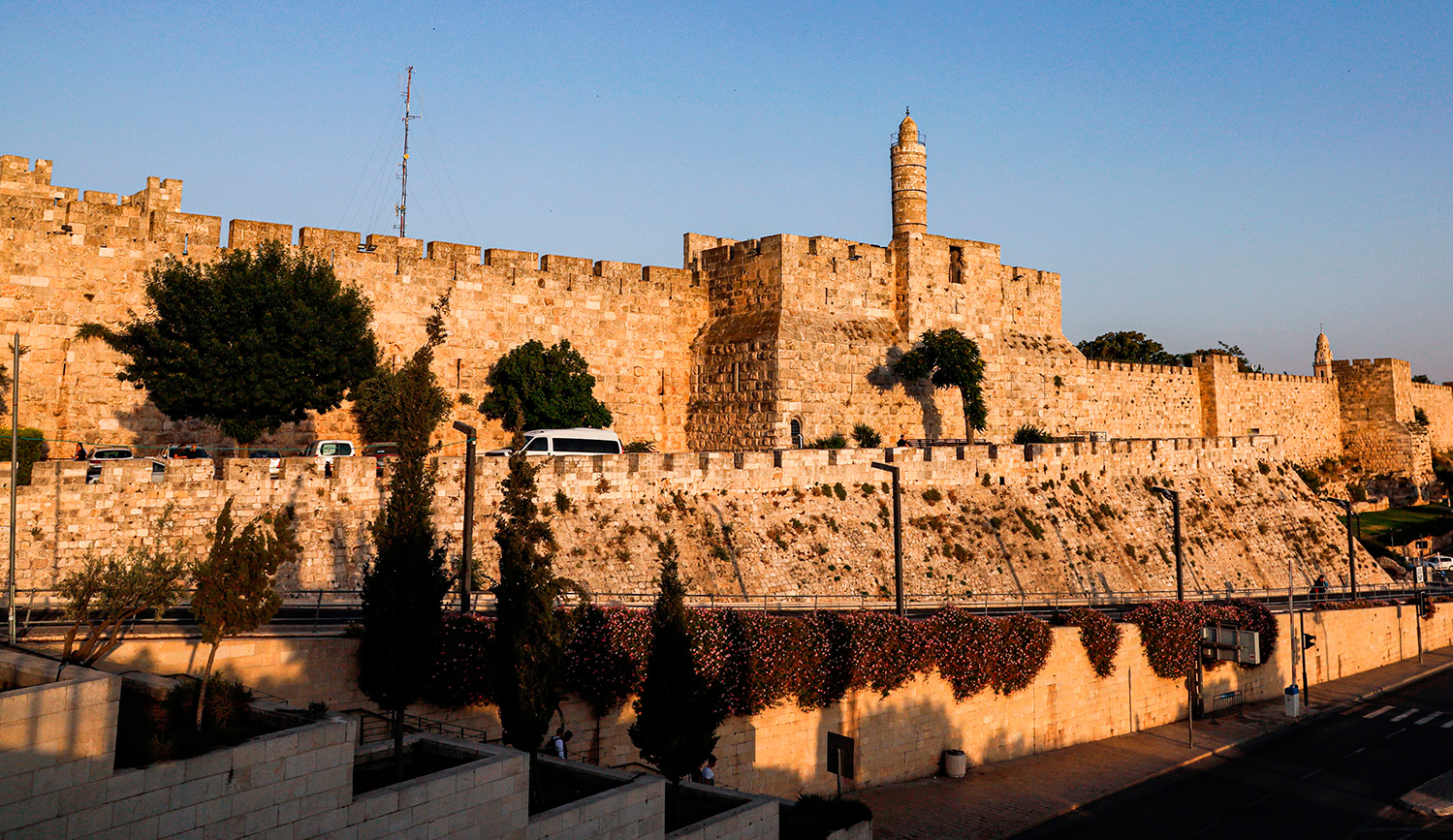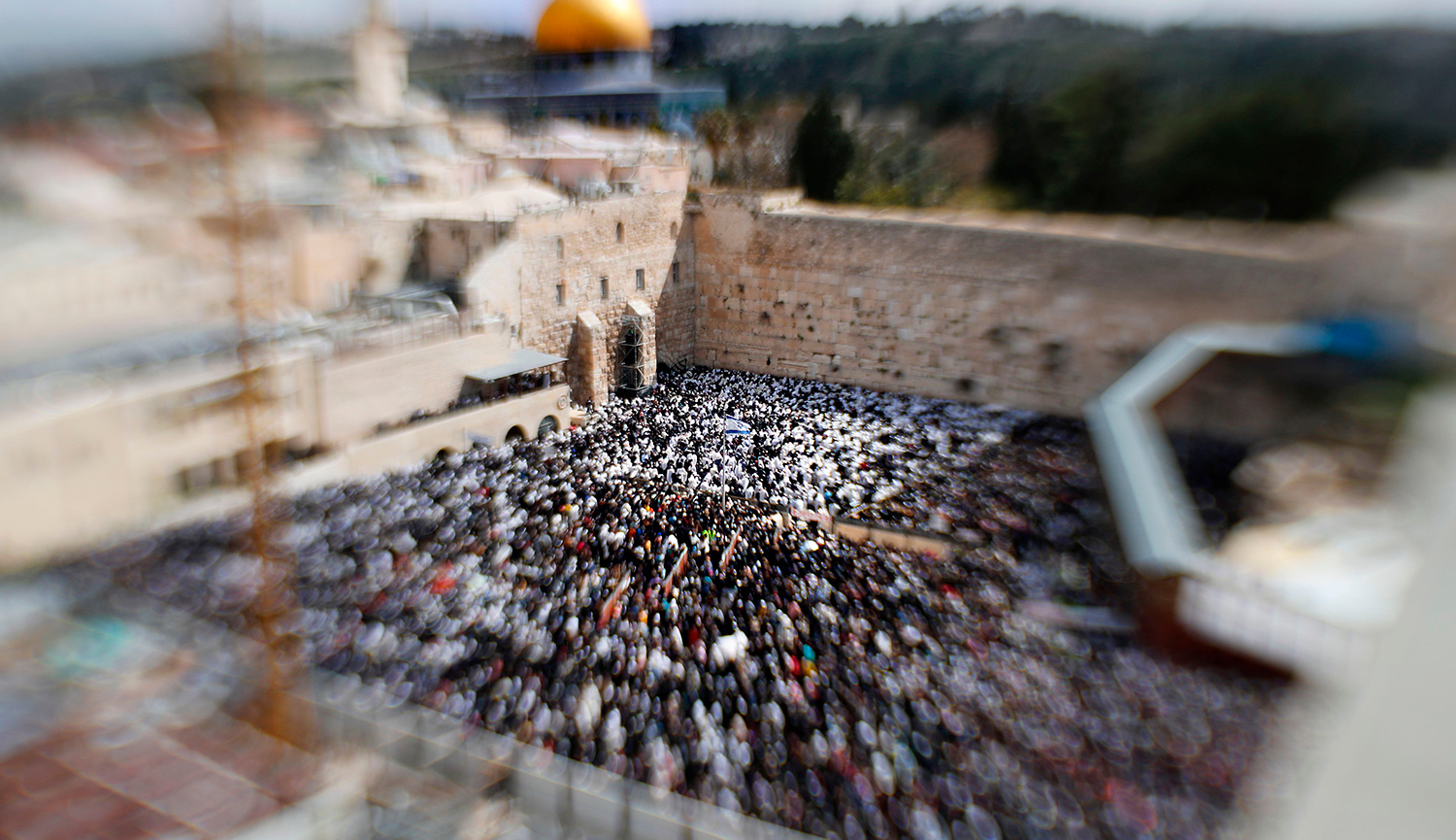In his essay in Mosaic on diplomacy, law, and Jerusalem, the estimable Michel Gurfinkiel asks, “What is international law?” and comments, “It’s easy enough to doubt, if not to mock, the idea that there is such a thing.” It sure is. The last century of U.S. policy on Jerusalem is a tale of cynicism and sanctimony that makes one wonder whether U.S. officials ever take international law seriously.
The Holy City commanded little international attention in the 700 or so years after Muslims defeated the Christian Crusaders. That changed, however, in December 1917, when British forces captured Jerusalem from the Ottomans in World War I. The city and its holy places became a diplomatic issue. British officials spoke passionately of their duty to keep the city and its holy sites under Christian—and specifically British—control.
Handing it all back to the Muslims was out of the question for the men who led the British Empire. Even those who were pro-Zionist, such as Prime Minister David Lloyd George, couldn’t quite imagine Jews in charge of the city, with authority over the Church of the Holy Sepulcher and the Garden of Gethsemane. Nor was Lloyd George receptive to claims of interest in Jerusalem by the French, whom he scorned as “atheistic” or, in any event, Roman Catholic.
For the 30 years after World War I, Britain administered Palestine. Its officials established Jerusalem, naturally, as the seat of government there. Mostly Protestants, they quarreled with Vatican representatives and Eastern Orthodox Church clerics over various municipal matters, but one thing they all agreed on was that the city could not be entrusted to Muslims or Jews.
That was the origin of the idea that, when Palestine is eventually partitioned between the Jews and the Arabs, Jerusalem should be internationalized.
Partition of Palestine became an urgent matter in 1947 when war-weary Britain chose to relinquish the territory, asking the United Nations to decide its fate. The UN created a committee, which recommended a plan with four elements. (1) Part of Palestine would become a Jewish state. (2) Part would become an Arab state. (3) The two states would form an economic union. (4) Jerusalem and its environs would become a zone outside both new states, a “corpus separatum” under international control; that is, the world’s Christian powers could retain influence over the city.
On November 29, 1947, the UN General Assembly endorsed this plan. The United States voted in favor. Palestine’s Jewish leadership agreed to accept it, but the leaders of the Arabs in Palestine and the neighboring states did not, and launched a war to prevent Palestine’s partition.
None of the plan’s four elements survived the bloody fighting. The Jewish-majority state of Israel came into being, but not with Arab consent. Its postwar boundaries—the armistice lines that lasted from 1949 till 1967—were not those of the partition plan. The Arab state in Palestine never came into being. (Egypt and Jordan promptly seized the land intended for it.) The economic union never came into being. And Jerusalem never became an internationalized corpus separatum. Israel took over the city’s western part, and Jordan the eastern part, including the walled Old City.
Though the 1948-9 war had killed the plan, U.S. officials insisted that its corpus-separatum provisions precluded recognition of Jerusalem as Israel’s capital.
This became U.S. policy, but it wasn’t true.
First of all, the partition plan itself was not law. Soon after the UN General Assembly endorsed it, the State Department’s legal adviser wrote a memo clarifying that, under the UN Charter, it was nothing more than a recommendation, not legally binding on anyone.
Second, the plan was a package deal, and all relevant Arab parties had rejected it. No part of an offer survives rejection of the offer. When stateless, the leaders of Palestine’s Jews were willing to accept a state without Jerusalem if the Arabs would consent to that state without war. But that did not mean that Israel, having survived its war of independence, had relinquished Jewish claims to Jerusalem. Nor did it mean that the American vote for the partition plan obliged the United States to treat Jerusalem as a corpus separatum even after the plan became a dead letter.
And third, U.S. policy toward Jerusalem was a jumble of inconsistencies. U.S. ambassadors (from 1952 onward) presented their credentials to the Israeli president in Jerusalem. U.S. officials met with Israeli officials in Jerusalem. In practice, they couldn’t get around the fact that Jerusalem was Israel’s capital. In principle, however, they insisted it was not and that they were therefore required to maintain the U.S. embassy in Tel Aviv.
But there was no such requirement. The U.S. embassy to East Germany, for example, was in Berlin, even though the United States did not recognize East German sovereignty over that city.
Time after time, officials made arguments in the language of international law though they did not think rigorously about the law and did not show it real respect. U.S. officials repeatedly reaffirmed U.S. support for Jerusalem as an undivided city and a corpus separatum belonging to no state. By belittling the Jewish historical connection to Jerusalem, they helped delegitimate Zionism in general. This pleased Israel’s enemies but did nothing to encourage them to terminate their war against the Jewish state. On the contrary.
Underlying the U.S. position on internationalization of Jerusalem was the principle that all religious communities should have access to their holy places there. U.S. officials championed the internationalization of an undivided city as the best way to protect such access for everyone. But between Israel’s birth in 1948 and the 1967 Arab-Israeli Six-Day War, the city was in fact divided. The main Jewish holy places were in the eastern part, under Jordan’s control. The Jordanian army thoroughly destroyed Jerusalem’s Jewish quarter, razing its numerous synagogues and religious academies. It destroyed and desecrated the ancient Jewish cemetery on the Mount of Olives. Jordan did not allow Jews to live in its part of Jerusalem or even to visit their holy sites there.
But U.S. officials did not make a fuss about this. Neither directly nor through the United Nations did U.S. officials press Jordan to remedy Jerusalem’s division or grant Jews access to their holy sites. The principle of an undivided, internationalized city was important in U.S. policy only as a justification for keeping the U.S. embassy to Israel out of Jerusalem.
The first time U.S. officials publicly referred to “East Jerusalem” as “occupied territory” was at the United Nations in 1969, after Israel had unified Jerusalem in the 1967 war. Remember, Jordan had taken the eastern part in 1948-49 in an act of aggression that, at the time, the U.S. government denounced as such. That helps explain why the United States never recognized Jordan’s sovereignty over any of Jerusalem or the West Bank. Yet, so long as these areas were controlled by Jordan, which banned Jews from them, U.S. officials never called them “occupied territories.”
In 1967, by contrast, Israel took over eastern Jerusalem and the West Bank from Jordan in a defensive war. Just before, Israeli officials had informed Jordan’s king through the United Nations that, if Jordan did not join the Egyptian-Syrian aggression, Israel would leave Jordan alone; the king made the costly mistake of attacking Israel anyway.
After unifying the city, Israel gave all religious communities access to their holy places. Nevertheless, U.S. officials on countless occasions deprecated Israel as the “occupier” of “East Jerusalem,” as if “East Jerusalem” were an entity.
If American officials had been principled in their opposition to protracted “belligerent occupation” of territory acquired in war, they would have made a stink about Jordan’s position before 1967. If they were principled in their support of an undivided Jerusalem, they would not, after 1967, have made legal distinctions between the eastern and western parts of the unified city. Yet such distinctions became an element of everyday American diplomacy in Israel for 50 years.
After 1967, U.S. officials took the position that they were permitted to meet with Israeli officials in western Jerusalem, but not in the part of the city that Jordan had occupied, even though the United States had never recognized Jordan’s right to control any of Jerusalem. Now that Jordan was gone, U.S. officials were (absurdly) giving it retrospective recognition. The point was to show disapproval of Israel’s presence in eastern Jerusalem even though U.S. officials said that, in principle, they favored an undivided city.
In this same post-1967 period, U.S. officials began to urge the parties to the conflict, through negotiations, to determine the status of Jerusalem. That, too, bolstered Jordan’s claims to eastern Jerusalem, the very claims that the United States since the late 1940s had said were illegitimate. Also, calling for Jerusalem’s status to be determined through such negotiations was inconsistent with the idea of internationalization—because none of the parties ever favored internationalization. If the United States no longer supported internationalization, there was no reason to keep its embassy to Israel in Tel Aviv rather than Jerusalem.
What all of this meant in practice was that, after 1967, U.S. officials could not, in their official capacities, travel to eastern Jerusalem. So when in 1978 Vice-President Walter Mondale planned an Israel trip and wanted to visit the Western Wall in the Old City, U.S. State Department officials said he couldn’t make that visit as vice-president or be accompanied in the Old City by any Israeli officials. Jerusalem’s mayor, the famous Teddy Kollek, responded that the trip should be canceled. The Washington Post reported: “Vice-President Walter Mondale sought to settle a touchy diplomatic question yesterday by saying that he will visit Jerusalem’s Western Wall (the Wailing Wall) as a private citizen during his coming three-day visit to Israel, and that Jerusalem Mayor Teddy Kollek is welcome to accompany him.”
U.S. officials claimed they were allowed to meet with Israeli officials in western but not in eastern Jerusalem, so such meetings were kosher, as it were, in all of the various Israeli ministries except for the Justice Ministry, which had recently been relocated to Salah e-Din Street in eastern Jerusalem (just north of the Old City’s Damascus Gate). In 1977, State Department officials told U.S. Attorney General Griffin Bell not to meet with his Israeli counterpart at the ministry.
I remember visiting Israel as a U.S. official in the early 1980s. A State Department official admonished me not to hold a meeting with Israelis at the Jerusalem Hyatt Hotel on Mount Scopus because its tennis courts encroached on the 1949 armistice line. I never confirmed the encroachment, but the meeting was relocated.
This history of pettiness was more than just annoying for visiting U.S. officials and insulting to Israelis. It conveyed unconstructive messages from the U.S. government both about Israel and about international law.
Regarding Israel, it signaled that U.S. officials were sympathetic to arguments that the Jews in Israel were interlopers and should not be trusted to govern the Holy Land. This not only gratified but also emboldened Israel’s enemies. It did nothing to move the parties toward peace based on mutual compromise.
Regarding international law, U.S. policy on Jerusalem signaled that even those in the U.S. government—our diplomats—who knew and cared the most about international law didn’t actually respect it. They invented stuff and claimed it was a venerable tenet of the law of nations. They were not bothered by inconsistencies. They dropped any purported principle when it became inconvenient. All of this was shameful and brought the idea of international law into disrepute.
Now along comes the Trump administration and upsets the whole apple cart of U.S. Jerusalem policy. The effect—mirabile dictu, as they say in Yiddish—is that that policy is now clearer, more coherent, more consistent with basic principles of international law and more likely to encourage Israel’s Arab neighbors to accommodate themselves to reality and give up the idea that they can undermine Israel by denying its historical connection with Jerusalem and the Land of Israel. Hallelujah!
More about: History & Ideas, International Law, Israel & Zionism, Jerusalem, United Nations







